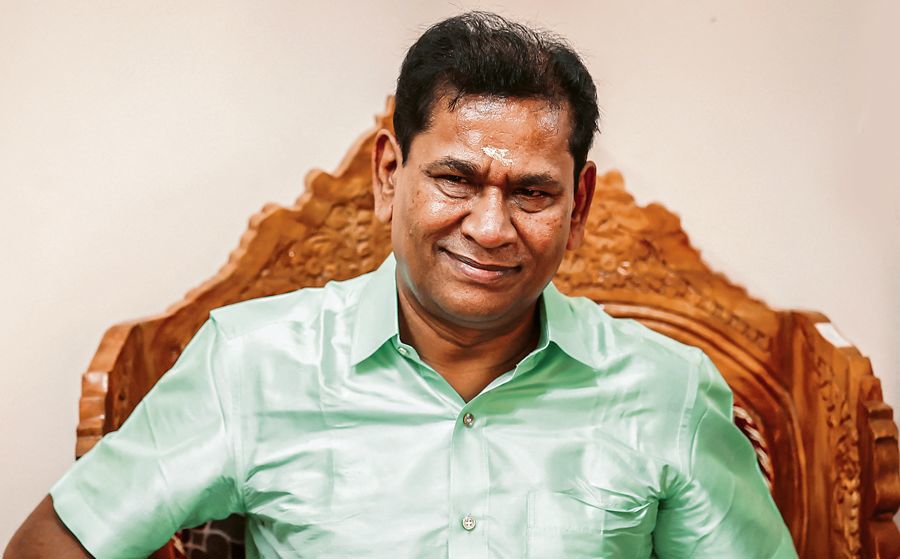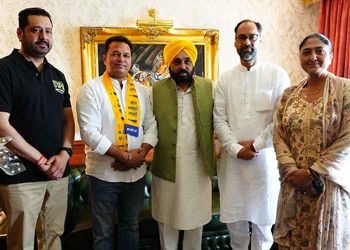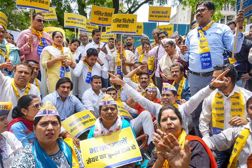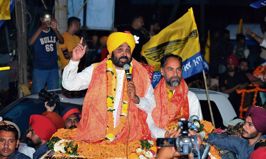
‘Lottery King’: Santiago Martin’s Future Gaming & Hotel Services was the biggest purchaser of electoral bonds. Reuters
WILL Santiago Martin, the ‘Lottery King’, play the spoiler in the unfolding drama of electoral bonds? Is the State Bank of India (SBI) playing ball with those in authority over the disclosure of the unique alphanumeric code numbers on the bonds that will identify those who benefited?
The Supreme Court has not permitted any latitude to the SBI, which had sought time till June to disclose particulars of the bond purchasers and recipients.
According to reports, the Enforcement Directorate (ED) launched a probe against Martin’s Future Gaming and Hotel Services in 2019. In October that year, he made a purchase of electoral bonds worth
Rs 190 crore. His total purchases touched Rs 1,368 crore. Why did the ‘Lottery King’ have to keep political parties indebted to him?
Martin’s firm is the biggest purchaser of electoral bonds. The biggest chunk of these bonds went to MK Stalin’s DMK. What did he hope to gain?
Home Minister Amit Shah says that his party’s wish to get rid of black money in the economy has come unstuck because of the Supreme Court’s judgment that the voters are entitled to know the identity of the donors and the political party that was favoured by each donor. I am puzzled! How do electoral bonds help achieve this end?
If a political party shouts from the rooftops that it wants to abolish black money and actually does the opposite by formulating a method that keeps voters in the dark about the source of the donation, I would, as a voter, frown on such an unreliable party.
Santiago is an interesting name. Many men by this name can be found in Spain and Portugal, maybe also in Italy. In Goa, the home of my ancestors, Santiago was a name that some boys were given at birth. The Portuguese colonisers introduced such names, which the natives adopted after conversion.
The surname Martin is an Anglicised version of Martinho. It can also be a given name. The Portuguese did convert a few families on the east coast of India in Bengal and Tamil Nadu. I know of families with the surnames Rosario in Bengal and Diaz in Tamil Nadu. A senior IPS officer of the Tamil Nadu cadre, SM Diaz, was appointed Director of the National Police Academy in the 1970s. In Kerala, the number of families converted by the Portuguese is far greater. They are locally known as ‘Latin Christians’ because the Mass was conducted in Latin till the vernacular was introduced. The services are in Syriac among Kerala’s earlier Christians, called Syrian Christians.
Whatever may be the origin of his name, the ‘Lottery King’, who hails from Coimbatore and started off as a labourer in Myanmar, is now rolling in cash. The lottery business is obviously a money-spinner. The BJP calls all gaming earnings sinful and imposes a sin tax on bets. Horse racing, which employs thousands of citizens, is being slowly smothered to death by 28 per cent GST levied on each bet placed at the club’s Tote.
As if that were not enough, a further 30 per cent income tax on all winnings is extracted at the time of encashing the winning tickets. Poor punters, who wager just a tenner or maximum Rs 50, have perforce given up the only excitement in their otherwise drab existence. They cannot turn to the unlicensed bookies as the latter do not deal in small amounts. The more affluent, who used to wager in hundreds on the legally blessed Tote, have also abandoned the racecourse because of negligible returns on winning bets.
Betting on the outcome of cricket matches is now the ‘in thing’ for the addicted gambler. It is thriving, though such gambling is illegal in India. In the UK, wagers on all forms of sporting events are allowed and licensed, though with conditions. No bet can be accepted from a child, for example. The gambling instinct is impossible to eliminate, especially through the legal process. Bans on betting only increase the contours of corruption. It will be more beneficial to regulate betting, like the UK has done. The government will then receive the taxes, the licensed bookmakers their profits and the punters their excitement.
On the electoral bond scheme, I thank the Supreme Court for not permitting any latitude to the government-controlled SBI, which sought time till June to disclose the particulars of the purchasers of the bonds and the recipients.
Donations by corporate houses to political parties are a necessity. In fact, every business house has to donate. If it fails to do so, the visits by myriad inspectors, who make a good living by inspecting, will not only be more frequent but also much more ‘expensive’. Business houses are geared up to face these inspectors. Some hire officials especially to ‘look after’ the inspectors. But the gaming outlets that have multiplied in recent years are a different kettle of fish.
It would be better for the citizens if their rulers stopped moralising about the vice of gambling and allowed it to surface on the open ground. Policemen who routinely shut their eyes to this ‘social evil’ and the politicians who extract their pound of flesh from the illegal operators will lose out, but the public will benefit in the long run. The government will rake in the taxes. On cricket betting alone, the government will be able to feed the millions now existing on 5 kg of rice or wheat which the government doles out every month. The statistics put out by the government show that nearly 60 per cent of the country’s people live on such doles. Incidentally, these statistics contradict assertions made by the government that poverty in India is on the decline. But we are now accustomed to fake and contradictory news items.
Shah and his colleagues in the BJP’s senior ranks are understandably unhappy with the revelations now emerging about the journey of the electoral bonds. They need not bother. Most educated people had already suspected the truth. The less educated and less affluent just do not care. They have become Modi bhakts because of the power of our PM’s rhetoric and the overpowering cult figure that his propaganda machine has created. The third term is his for the asking. It’s time for him to change gears and concentrate on ‘credibility’ as a more acceptable keeper of his legacy.
Join Whatsapp Channel of The Tribune for latest updates.




























